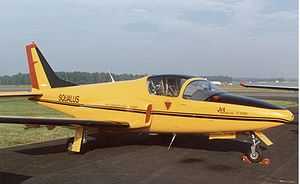Promavia Jet Squalus
| F.1300 Jet Squalus | |
|---|---|
 | |
| The prototype Promavia Jet Squalus exhibited at the Farnborough Air Show in September 1988 | |
| Role | Jet Trainer |
| National origin | Belgium |
| Manufacturer | Promavia |
| Designer | Stelio Frati |
| First flight | 30 April 1987 |
| Number built | 1 |
|
| |
The Promavia F.1300 Jet Squalus, also known as Promavia Jet Squalus F1300, was a two-seat light jet trainer designed by Italian Stelio Frati and built by Promavia in Belgium with support from the Belgian government.
Development
The Jet Squalus was designed by Frati and based on his earlier lightweight jet trainers the F.5 Trento and the F.400 Cobra. It was a low-wing cantilever monoplane with retractable landing gear. The Jet Squalus was powered by a Garrett TFE109 turbofan with engine intakes in above the wing root. The prototype, registered I-SQAL, first flew on 30 April 1987.[1] The aircraft was fitted with four underwing hard points for disposable stores to allow weapons training.
Operational history
With the demise of the similar American Fairchild T-46 trainer in 1986 the support for the engine disappeared and it was planned to re-engine with the Williams-Rolls FJ44. The aircraft was exhibited at the Farnborough Air Show in September 1988, but the project folded and Promavia went bankrupt in 1998. An unflown second prototype was to be modified for airline pilot training, and the unfinished third prototype was to be pressurised.
Variants
Data from:Jane's All the World's Aircraft 1988-87[2]
- F1300 NGT
- The baseline jet trainer version of the Procaer Cobra lineage.
- F1300 AWS-MS/SAR
- Maritime surveillance/search and rescue.
- F1300 AWS-R
- Reconnaissance.
- F1300 AWS-W
- Armament trainer or Police/Border defence.
- F1300 AWS-TT
- Target tower.
Specifications
Data from Jane's All The World's Aircraft 1993–94 [3]
General characteristics
- Crew: 2 (pilot, student)
- Length: 9.36 m (30 ft 8½ in)
- Wingspan: 9.04 m (29 ft 8 in)
- Height: 3.60 m (11 ft 9¾ in)
- Wing area: 13.58 m2 (146.2 ft2)
- Empty weight: 1,300 kg (2,866 lb)
- Gross weight: 2,000 kg (4,409 lb)
- Powerplant: 1 × Garrett TFE109-1 turbofan, 5.92 kN (1,330 lbf) thrust
Performance
- Maximum speed: 519 km/h (322 mph)
- Cruising speed: 482 km/h (299 mph)
- Range: 1,850 km (1,150[4] miles)
- Service ceiling: 11,275 m (37,000 ft)
- Rate of climb: 12.7 m/s (2,500 ft/min)
Armament
- 4× underwing hardpoints, 150 kg (330 lb) capacity each
See also
- Aircraft of comparable role, configuration and era
References
- John W.R. Taylor, ed. (1988). Jane's All the World's Aircraft 1988-89. London: Jane's Informaation Group. ISBN 0 7106 0867 5.
- Jane's All the World's Aircraft 1985–86. London: Jane's Publishing.
- Lambert, Mark (1993). Jane's All The World's Aircraft 1993–94. Coulsdon, UK: Jane's Data Division. ISBN 0-7106-1066-1.
- Taylor, Michael J. H. (1989). Jane's Encyclopedia of Aviation. London: Studio Editions.
- Simpson, R.W. (1991). Airlife's General Aviation. England: Airlife Publishing. ISBN 1-85310-194-X.
| ||||||
| ||||||||||||||||||||||